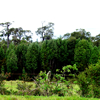
 |
The restoration of dryland forests in Latin America |
Ecological restoration in areas of environmental degradation can help reverse global biodiversity losses, as well as promoting recovery of ecosystem services according to new research published online in the leading journal Science. However the research also showed that measures of biodiversity and ecosystem services are higher in pristine land, freshwater and marine systems than in restored systems.
Examples of ecosystem services include improved water quality and increased carbon storage, services which benefit human well-being.
The research was carried out by an international team from the Centre of Conservation Ecology and Environmental Change, Bournemouth University; the University of Alcalá in Spain, and the UK’s Centre for Ecology & Hydrology. It will be published on the Science Express website at 1900 BST (1400 pm U.S. Eastern Time) on Thursday, 30 July 2009.
Co-author Professor Adrian Newton, from Bournemouth University said: "These results highlight the importance of ecological restoration approaches for addressing the environmental degradation that has occurred in many parts of the world. The research suggests that restoration can offer a 'win-win' solution, by increasing the provision of environmental benefits to people, while at the same time increasing biodiversity."
Ecological restoration is widely used to reverse the environmental degradation caused by human activities. However, the effectiveness of restoration actions in increasing provision of both biodiversity and ecosystem services has not previously been evaluated systematically.
The research team analysed results from 89 restoration assessments carried out in a wide range of ecosystem types across the globe. On average, ecological restoration increased provision of biodiversity and ecosystem services by 44% and 25% respectively. Increases in biodiversity and ecosystem service measures following restoration were positively correlated. However, values of both remained lower in restored than in intact (undamaged) reference ecosystems.
The research is an output of the ReForLan project, focusing on restoration of dryland forests in Latin America, a major initiative coordinated by Prof. Newton at Bournemouth University.
31/07/09